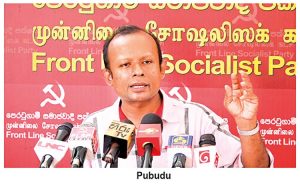The government is forging ahead with its ambitious education reform package, amidst protests by teachers’ trade unions, university teachers and other stakeholders.
Speaking at an event to raise awareness of the education reforms, among education officials, teachers and the public, at the Dakshinapaya Auditorium in Galle, on Saturday, Minister of Education and Prime Minister Dr. Harini Amarasuriya said the new policy was aimed at overhauling Sri Lanka’s education system by reducing classroom sizes, enhancing teachers’ professionalism, modernising curricula, and integrating vocational pathways into the mainstream.
“It is not possible to deliver quality education in classrooms with 50 or 60 students,” the Prime Minister said. “Our goal is to limit the number of students in a classroom to between 25 and 30.”
Dr. Amarasuriya emphasised that the reforms would go beyond curriculum revision, and aim to restructure administrative systems and improve infrastructure to ensure equal access to quality education for all children.
“The curriculum in teacher training colleges has not changed for the past 16 years. From August onwards, we will begin training teacher trainers to deliver updated, relevant instructions,” she said.
The event was the fourth in a series of provincial awareness programmes aimed at briefing the education authorities on the reform
initiative. Southern Province Governor Bandula Harischandra, Deputy Minister of Vocational Education Nalin Hewage, NPP MP Nihal Galappaththi, Ministry of Education Secretary Nalaka Kaluwawa, and Southern Province Chief Secretary Sumith Alahakoon were among those present besides a large number of officials from the Department of Examinations, National Institute of Education (NIE), and zonal education authorities.
Deputy Minister Hewage said the government intended to align vocational training institutions with the broader reform agenda. “Students will be able to pursue vocational education based on talent and interest rather than being pushed into it solely due to academic underperformance,” he said.
However, teachers’ trade unions have sharply criticised the government for implementing reforms without adequate consultation. General Secretary of the Ceylon Teachers’ Union, Joseph Stalin, has warned of countrywide protests unless the government included all stakeholders in the reform process.
Speaking to The Island, Stalin said the current reform framework was based on recommendations made several years ago by Dr. Upali Sedara and that the government’s decision to implement it wholesale was “completely unacceptable.”
He also said the government’s plans to introduce the reforms to Grades 1 through 6 starting next year were hasty; no teacher training sessions had been held, and the NIE had not been officially informed of how to set about the task.
“No education reform can be successful without addressing five key issues: exam structures, student admissions, university entrance competition, and vocational and skills development,” Stalin said. “If the government continues to push its own agenda without addressing these concerns, we will be forced to launch widespread protests involving schools, universities, teachers, and unions.”
Prime Minister Dr. Amarasuriya has maintained that the reforms were developed in consultation with experts and based on the government’s broader policy framework. “This is not for personal or political gain,” she has gone on record as saying. “It is our responsibility to understand the country’s needs and act accordingly.”
By Akitha Perera and Sujeewa Thathsara 
